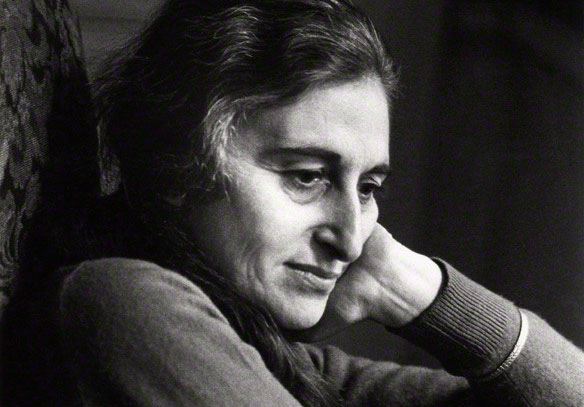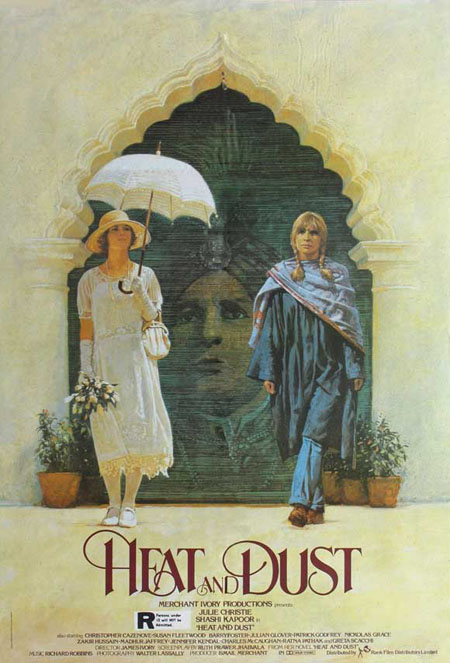“Ruth Prawer Jhabvala, a German-born novelist whose fiction was set largely in India and who gained her greatest acclaim as a two-time Academy Award-winning screenwriter with the Merchant-Ivory filmmaking team, died April 3 at her home in New York City,” reports Matt Schudel for the Washington Post. She was 85.
Jhabvala, producer Ismail Merchant and director James Ivory “met in 1961, and almost immediately became collaborators, as well as close and lifelong friends,” writes Janet Watts in the Guardian. “Soon after Merchant and Ivory themselves met (in New York), Merchant proposed that they make a film of Jhabvala’s early novel The Householder (1960). The pair then went to Delhi and asked her to sell them the book and write a screenplay of it in eight days flat. Over the next five decades, she wrote 23 screenplays. The collaborations included adaptations of E.M. Forster’s A Room With a View (1985) and Howards End (1992), for both of which Jhabvala won Academy Awards; and Henry James’s The Bostonians (1984) and Kazuo Ishiguro’s The Remains of the Day (1993). Jhabvala’s two Oscars put her in the incongruous company of Bette Davis and Elizabeth Taylor; journalists reported how odd the gilt statuettes looked in her plain New York flat. She did not care. Her own fiction was what mattered to her, whether or not it did to anyone else.”
About a year ago, Denis Faye interviewed Jhabvala for the Writers Guild of America, and she told him that “there’s a Machiavellian aspect to adapting even the most beloved of literally works. ‘I honored those books, and I loved them,’ she continues, ‘but the moment I started to make them into a screenplay, I became most disrespectful, did exactly what I thought I should be doing to make it interesting for a cinema audience. I changed things. My love for the book always remained, but I knew I had to let go of it. I had to feel absolutely free to make the characters move and live the way they would on the screen rather than on the page.'”
In 2000, Philip Horne had a lengthy conversation with Jhabvala for the Guardian about adapting James’s The Golden Bowl.
Just a couple of weeks ago, the New Yorker ran a new short story by Jhabvala, “The Judge’s Will.”
Updates, 4/4: “Her 1975 novel, Heat and Dust, about an Englishwoman exploring a family scandal in India, received the Man Booker Prize, Britain’s highest literary honor,” notes Anita Gates in the New York Times. “She wrote the screenplay for the Merchant Ivory version in 1983 as well…. Mr. Merchant, who died in 2005, was Indian, and Mr. Ivory is American, but Mrs. Jhabvala brought a combination of cultural backgrounds to their film collaborations… The last film the three Merchant Ivory principals made together was Le Divorce (2003), a contemporary story about Americans in Paris based on Diane Johnson’s novel. After Mr. Merchant’s death, Mrs. Jhabvala and Mr. Ivory worked together on The City of Your Final Destination (2009), another literary adaptation, of the Peter Cameron novel, set on an estate in Uruguay inhabited by Europeans, played by Laura Linney and [Anthony] Hopkins. Holding dual British and American citizenship, she was made a Commander of the Order of the British Empire, for her service to literature, in 1998.”
“Often, though not always, [the Merchant-Ivory-Jhabvala] films captured a lost era,” writes Thessaly La Force for the Paris Review. “One where women were chaperoned to Italy, where a stolen kiss on a hilltop could cause scandal, where class was never directly discussed, and fortune was hunted like prey. And today we must mourn the loss of a kind of filmmaking that took care to not appear superficial in obsessing over the past.”
“In 1939 she and her family were among the last Jews allowed to leave the country and arrived in England just ahead of the German blitzkrieg,” notes Elaine Woo in the Los Angeles Times. “She read War and Peace in a bomb shelter and started writing her own stories. In 1948, her father, unable to bear the grief of having lost his entire extended family in the Holocaust, took his own life. ‘All my stories have a melancholy undertone. That’s probably why,’ Jhabvala, who was 21 when he committed suicide, told the Guardian of London in 2005…. ‘I only really woke up in India. It was my first experience of plenty, strangely enough, because everything in England was rationed,’ she said in the Guardian interview.”
Joshua Rothman in the New Yorker: “We’ve unlocked six of Jhabvala’s stories: ‘The Judge’s Will,’ ‘The Teacher,’ ‘Aphrodisiac,’ and ‘Innocence,’ which have all been published recently, along with ‘On Bail,’ from 1973, and ‘The Interview,’ from 1957, which was Jhabvala’s first story for The New Yorker. And subscribers can read all of her stories in our online archive.”
Update, 4/9: Vincent LoBrutto’s 1997 interview with Jhabvala, published in Backstory 4, “is imperative reading for aspiring screenwriters, particularly those interested in adaptation,” advises Graham Fuller at Artinfo.
Update, 4/12: From James Ivory‘s tribute in Time: “Henry James, one of her favorite authors, once wrote that it is no bad thing for a young man to go to school to a clever woman. I was that young man. But in her case, she actually had two young men to educate, Ismail Merchant and myself: an education that lasted down to the end of our association with her.”
For news and tips throughout the day every day, follow @KeyframeDaily on Twitter and/or the RSS feed. Get Keyframe Daily in your inbox by signing in at fandor.com/daily.





